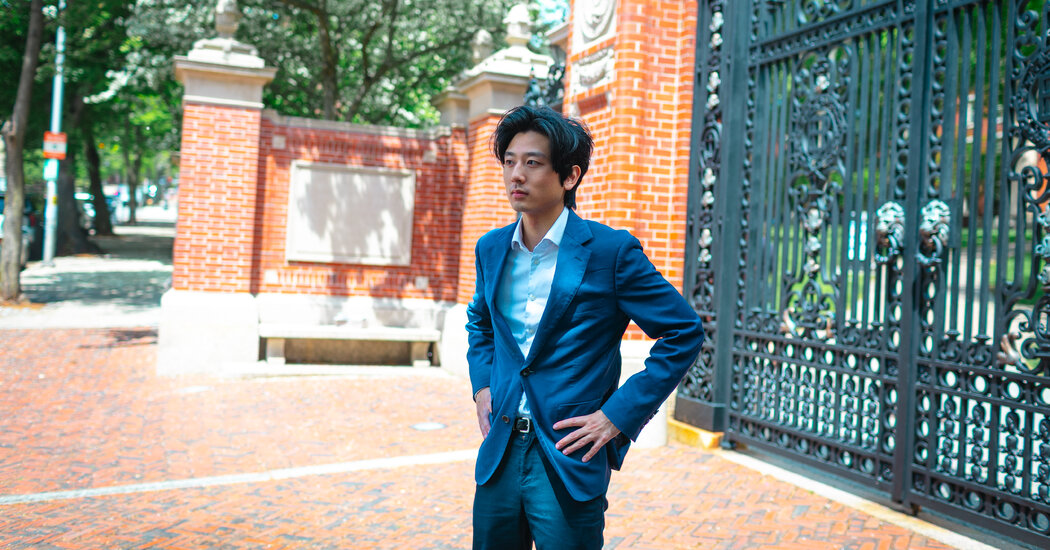Thousands of administrative employees at Brown University woke up this spring to an email with pointed Elon Musk-like questions about their job responsibilities.
Please describe your role, it asked. What tasks have you performed in the past week? How would Brown students be affected if your job didn’t exist?
The March 18 email was from a sophomore, Alex Shieh, who explained that the responses would be included in a story for The Brown Spectator, a new, as yet unpublished conservative newspaper on campus.
His questions were undoubtedly sensitive for elite universities like Brown, where the cost of tuition, housing and other fees has risen to $93,000. Critics, including President Trump, accuse the schools of padding their budgets with redundant layers of deans and associate deans, bloated diversity programs and niche academic divisions.
Many recipients of the email, including those in the Office of Student Conduct and Community Standards, were not amused — no doubt aware that Mr. Musk, whose Department of Government Efficiency was ripping like a hacksaw through the federal bureaucracy, had asked government employees similar kinds of questions.
Two days later, Brown notified Mr. Shieh that he was under investigation for possible violations of the university’s code of student conduct, including its prohibitions on invasion of privacy, misrepresentation and emotional or psychological harm.
With that, his case — and that of two Spectator students who were later placed under investigation — became the latest flashpoint in the free speech wars on American college campuses.
Brown eventually cleared all three students of wrongdoing. But their case is yet another example of how universities continue to struggle with protecting the rights of students to express themselves on campus, after years of trying to adjudicate just when political expression tips into harassment.
The story quickly became a cause on the right — more evidence, conservatives said, that higher education is stacked against them and needs the government to step in to force reform. Fox News, Charlie Kirk and The New York Post ran with stories about what they saw as this new affront. And on Wednesday, Mr. Shieh is scheduled to testify before a House committee investigating high tuition costs.
Brown was already under political pressure. The Trump administration is threatening to block $510 million in federal contracts and grants for the university, part of a campaign to hold universities accountable for tolerating pro-Palestinian activism that many Jewish students and faculty saw as antisemitic.
A spokesman for Brown said that the university followed a standard procedure for students accused of conduct violations, and that this case was no different.
“Brown proceeded in complete accordance with free expression guarantees and appropriate procedural safeguards under University policies and applicable law,” Brian Clark, the spokesman, said.
Universities are generally able to impose restrictions on some speech in the name of fostering respect and tolerance.
But “just because the school can regulate something generally doesn’t mean they should — or that they can weaponize those regulations against a certain speaker,” said Dominic Coletti, of the Foundation for Individual Rights and Expression, a free-speech advocacy group that intervened in Mr. Shieh’s case and urged Brown to drop its investigation.
Mr. Sheih, a computer science-economics major, has been something of a campus gadfly, known as “the Fox News kid” for his involvement in conservative politics and occasional national media appearances.
Early in the semester, he and about a dozen other students were discussing the relaunch of The Brown Spectator, which had been defunct for a decade. They agreed to do an article on the increase in administrative positions at the university, an issue throughout academia that critics say illustrates how colleges have strayed from their core educational functions.
Then in February, when Mr. Musk demanded that federal workers justify their jobs or risk termination, Mr. Shieh borrowed the idea.
First, he created a database that listed all 3,800 staff and administrative positions at Brown and categorized them based on an A.I.-powered analysis of the work each position entailed. Then, when he sent the email on March 18, Mr. Shieh included a link to his website along with the questions about job responsibilities. He also asked employees to comment on his characterizations of their work, since not all of them were flattering.
Mr. Shieh said that he was trying to make a universal point about the cost of higher education.
“It’s not inherently conservative to want to make education more affordable,” he said.
The vast majority of the people who received the email ignored it. Some complained to the university. A few replies seemed to forget the Queen’s English.
But several employees described the value of their jobs: among them, a teaching assistant with 95 students; a financial coordinator who handles office expenses; an actor who role-plays a sick patient for medical students.
Brown says its administrative staff of 3,800 has expanded to support a growing number of students and projects it undertakes as a top research university. Between 2014 and 2024, undergraduate enrollment rose by 18 percent, and graduate student enrollment by 59 percent.
At first, Mr. Shieh’s email caused some confusion because The Spectator was not known on campus. To ensure their independence, the students said they did not register with the university, nor were they required to. (They did register with the state of Rhode Island, where Brown is located, as a nonprofit corporation in February.)
The university had concerns that Mr. Shieh, who is listed in public filings as the publisher of The Spectator, had falsely presented himself as a reporter and had improperly accessed university data systems containing staff information, most of which was publicly available. Some employees took umbrage with having their jobs described as wasteful and insignificant.
After some discussions with Mr. Shieh and representatives from FIRE, Brown decided to drop the misrepresentation charge. But the university also added a new allegation: trademark infringement. It accused Mr. Shieh of using the university’s name in the Spectator’s title without permission.
After his colleagues at The Brown Spectator published an editorial arguing that a vibrant campus depended on “the freedom to ask hard questions, publish unpopular opinions, and hold powerful institutions to account” — hardly a controversial position — the university notified two of them that they could face discipline for a trademark violation as well.
Benjamin Marcus, editor in chief of The Spectator, said that before publishing its editorial, he and the managing editor joked, “There’s no way they’re going to charge us.”
Both students soon learned their confidence was misplaced. Even so, Mr. Marcus said that his disciplinary experience felt like a relief compared with his experience on campus as an Orthodox Jew and supporter of Israel. Brown, unlike many other schools, called in the police relatively early when student protesters occupied university property, resulting in dozens of arrests. But some students felt that the university had allowed a hostile atmosphere toward Jews to take root.
“I got heckled, spit at, flipped off,” Mr. Marcus said. “It was very rough.”
To then face disciplinary action from the university — with finals approaching — was confusing, he said.
“I don’t want to pick a fight with the university,” said Mr. Marcus, who is also president of the College Republicans. “I just want the paper to be alive and well.”
Last week, the university released an updated mission statement that its president said was intended to articulate in “plain, uncomplicated terms” a commitment to learning “without interference or censorship.” For the first time, Brown also adopted a formal policy to forgo any public statements “on topics unrelated to its mission.”
Glenn C. Loury, an economics professor at Brown known for his contrarian views, said that it was encouraging to see the campus, and higher education in general, make what he considered small commitments to free speech.
Still, he said, “I don’t expect universities to be remade overnight.”
In the meantime, he suggested that Brown may have inadvertently lifted the prospects for both Mr. Shieh and The Spectator.
“He seems to be having a good time,” Dr. Loury said of Mr. Shieh, whom he has taught and found to be smart, driven and self-aware. “Going after these kids wasn’t the wisest move.”
After a 10-year hiatus, the first issues of The Brown Spectator started appearing on campus last month — 700 copies, according to Mr. Marcus. Before distributing them, he said, The Spectator notified the university.
Jeremy W. Peters is a Times reporter who covers debates over free expression and how they impact higher education and other vital American institutions.
The post A Student at Brown Channeled Elon Musk. Then He Got in Trouble. appeared first on New York Times.




